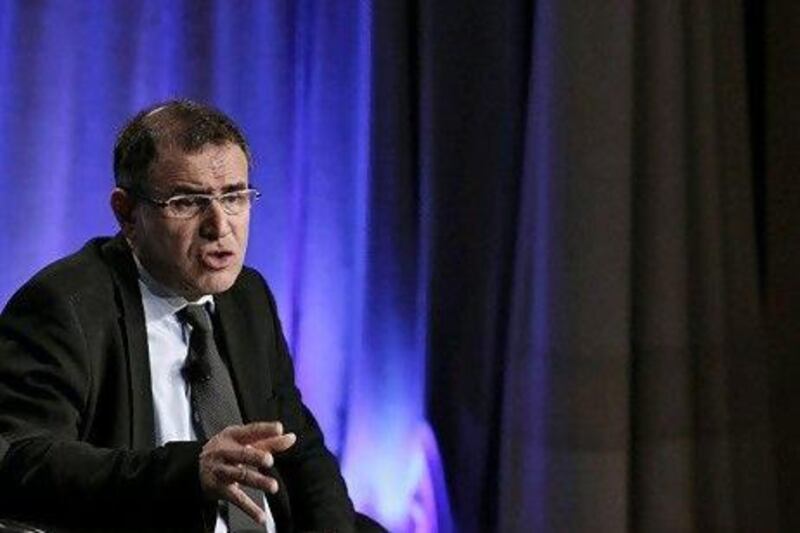ASTANA, KAZAKHSTAN // The famed economist Nouriel Roubini believes it would be better if an "orderly exit" from the euro zone were organised for Greece as the country's economy is "dysfunctional".
Mr Roubini, known for his pessimistic views on global economic issues, was the star of the show on the opening day of the Astana Economic Forum in Kazakhstan when he delivered a characteristically doom-laden message at the Palace of Independence.
"The problems of the euro zone are the most troubling issue currently facing the world economy," he said. "It is clear that six EU states - Greece, Italy, Portugal, Spain, Ireland and Cyprus - are in trouble, with too much public debt and low economic growth.
"Even in Germany and other 'core' countries, growth is being affected, and I can only see the problem getting worse."
In addition to worries about low growth and the stability of the euro, Mr Roubini said Europe also had serious problems in its banking system.
He pointed out that banks were undercapitalised and that the region faced another "credit crunch" similar to that of 2008's, which he predicted three years earlier.
High oil prices added to the pressure on governments, while political tensions and uncertainty over how to react to the euro-zone crisis were already affecting the region's core countries, such as Germany, the Netherlands and France.
"Bailout fatigue is setting in, and these countries will soon tire of having to keep giving handouts to countries on the periphery," he said. "It would be better if an orderly exit could be organised than trying to keep Greece in the euro zone. We have already seen social instability in the country and a run on its banks, and this can only get worse."
Mr Roubini also warned that the policy of fiscal austerity being advocated by Germany and others risked prompting a political backlash in the smaller countries, which were trapped in a cycle of falling economic growth and rising debt.
"After that, there must be more integration, or there will be disintegration. The whole of the euro zone could be at risk," he said.
The problems of the banking industry were also very severe, especially in peripheral countries such as Ireland.
Mr Roubini urged policymakers not to adopt the "Irish solution", in which governments take over banking debt. The "Icelandic solution", where banks were allowed to go bust, was a better option.
"It would be better if bondholders take some losses," he said. "It would be a mistake, for example, for Spain to borrow from the EU to recapitalise its banks, and far better to do it via the European financial support fund in a direct recapitalisation."
Turning to the United States, Mr Roubini was slightly more upbeat, saying there was a mix of good news and bad.
"The good news is that there is some economic growth - we estimate around 2 per cent this year," he said. "The other positive is that the corporate sector is strong and profitable."
But the USalso facedchallenges.
"The bad news is that the recovery is still below trend, and there is a lot of deleveraging going on at federal, state, and even down to household level," he said. "The difficult choices have just been postponed. Fiscal discipline has not been imposed. Consumers are still spending, but not because they are confident of rising salaries.
"They are spending because of the stimulus given them by the government. But at some stage, taxes will have to be raised. The US still faces the prospect of further downgrades by the ratings agencies."
Mr Roubini was more optimistic about the economic prospects for the so-called Brics countries of Brazil, Russia, India, China and South Africa, as well as other emerging markets, including Kazakhstan.
"The rise of the emerging markets has been one of the few positive things about the global economy recently," he said. "It is not just China and India, but a country like Kazakhstan, growing at 7 per cent this year, is also part of this growth phenomenon.
"Middle East wealth from oil is also a positive thing. But we cannot take the emerging markets and the Brics for granted.
"One of the good things that came from the crisis was that governments intervened to support economies when they needed it," he said.
But true to form, Mr Roubini, who has predicted a "hard landing" for the Chinese economy, ended in gloomy fashion by standing by his prognosis. "There has already been a slowdown in growth, infrastructure investment and exports. I still predict a hard landing in the next two years."
twitter: Follow and share our breaking business news. Follow us
iPad users can follow our twitterfeed via Flipboard - just search for Ind_Insights on the app.





